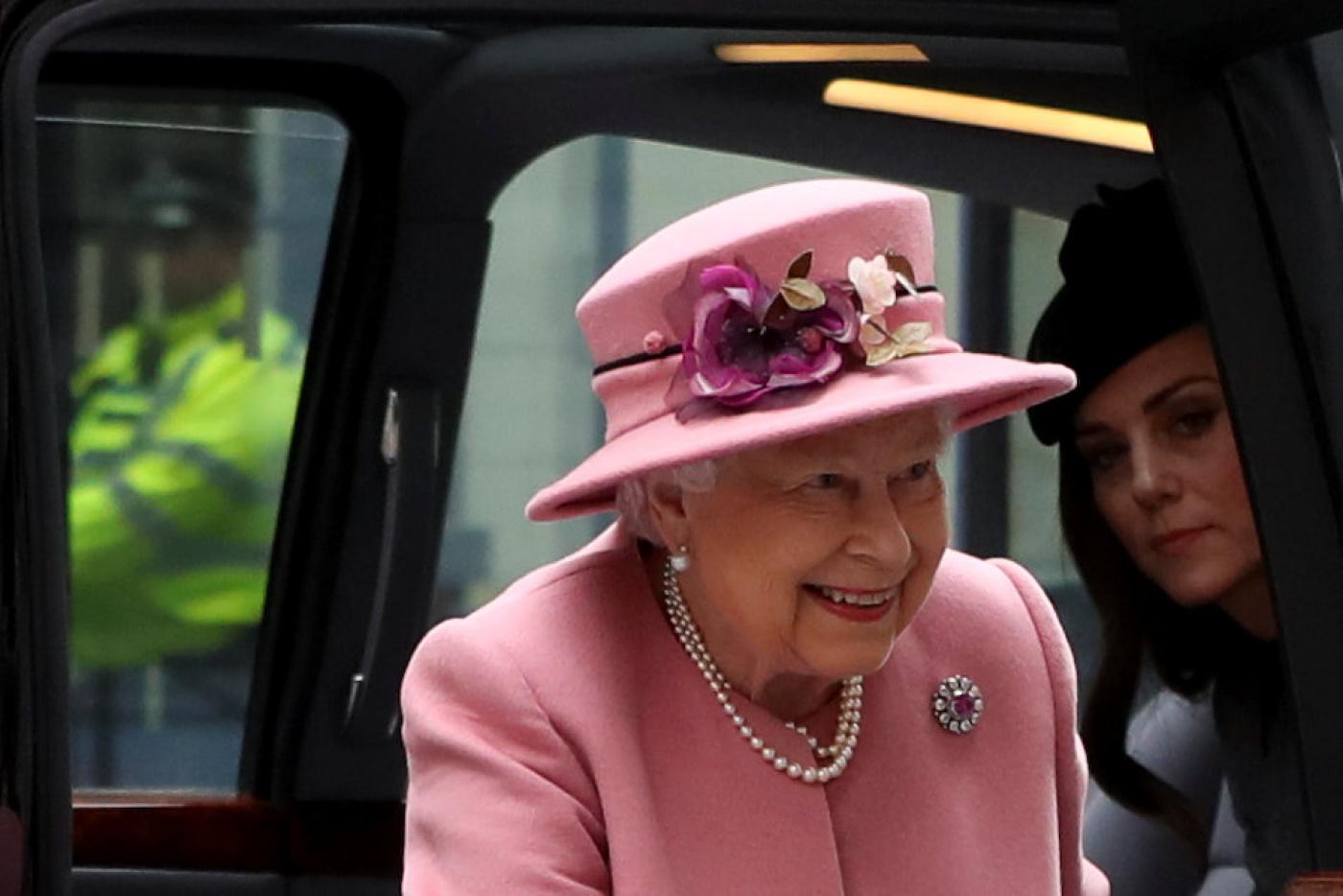Pro-Palestine students denied university access during Queen's visit

Students at King's College London who had taken part in previous protests locked out of buildings despite needing to sit exams
Pro-Palestine students at one of the UK's top universities have said they were denied university access over security concerns during a visit by the Queen on Tuesday.
Students at King's College London said they were barred from attending classes and sitting exams because of their political activity, a claim which appears to be supported by comments made by a senior university official, who said that students were blacklisted based on CCTV footage.
Coming one day into Israeli Apartheid Week, a range of actions in support of the Boycott, Divestment and Sanctions movement, the incident raises fresh questions about the increased securitisation of universities and tolerance of dissent on campus.
Dressed in pink, the Queen had stepped out to thronging crowds on Tuesday to open a refurbished building at the university's Strand campus in central London.
Meanwhile, six kilometres away in south London, medical student Asif, who asked to be identified by his first name only, had arrived early to sit a compulsory exam but had been blocked from the university building where it was supposed to take place.
"Considering that the exam is in an hour and if I don't sit it I potentially have to resit the entire year, it was very, very distressing for me," he told Middle East Eye.
Asif was eventually allowed to take the exam, but said the uncertainty "directly impacted how I felt right before my exams".
"It affected me a lot,” he added.

A member of the Action Palestine student society, Asif reached out to other student activists who also said they were blocked from accessing university premises.
Ten students have now come forward, claiming that they were banned from all campuses, libraries and cafes and were unable to attend exams, work shifts, classes and assessed presentations.
Drawn from Action Palestine and KCL Justice4Cleaners, a fair-wage campaign for cleaning staff, they said in a statement: "The students affected by this are all core organisers of campaigns that have established themselves as effective, successful and resistant to university apathy and reaction."

"The racialised and gendered securitisation of campus also cannot be ignored; the affected students are predominantly women of colour."
A student who wishes to remain anonymous said they "started crying and begging to let be let in".
King's issued a general statement, claiming that because of the high-security nature of the occasion some of its buildings were not accessible.

"We had an event today which demanded the highest level of security and we had to minimise movement through buildings for security reasons," a university spokesperson told MEE. "At times some of our buildings were not accessible."
In response to the statement, Asif said "they've come up with this statement recently that they only blocked access to certain buildings because it was a high-security event, but the reality is that I was nowhere near there. You blocked my access everywhere."
"I was nowhere near the Queen considering that she was the one that they did this for supposedly."
On Monday, Asif and other students had broken into a meeting of the college council, the university's highest decision-making body, to deliver an open letter demanding the severing of ties with Techion, an Israeli research institute with close links to the arms trade.
A video of the event circulating online, which marked the start of Israeli Apartheid Week, shows a peaceful protest with students unfurling a banner and chanting slogans.
However, Asif claims that those who took part also had their university access revoked during the Queen's visit, adding that "they've basically blocked people who they consider to be social activists".
University compiled list of student protesters
Pro-Palestinian students have in the past expressed concerns that their activities have been monitored by university authorities, who have sought to managePalestinian activism to meet their requirements under the government's controversial Prevent counter-terrorism policy.
King's students have taken this one step further and now claim that university authorities had worked with the Metropolitan police to ban all students that could be considered a security threat during the Queen's trip.
The university has officially refused to be drawn on this, but when confronted by students, a senior staff member said on Tuesday that the university had compiled a list of student protesters ahead of the Queen's visit, according to video footage seen by MEE.
Asked by a female student on what grounds the list was put together, Richard Kent, director of campus operations, responded: "It was just produced on the grounds that you're all... there are a number of protesters who've been visible at a number of protests over last year, two years, and you were identified because you were on CCTV."
King’s College Students Union said it stood "in solidarity" with students affected by the "surveillance and disruption".
"It is concerning if students are being placed under surveillance by their university – this is a place of learning, not a police state, and surveillance has a chilling effect on students' freedom of expression," the union said.

Ilyas Nagdee, the National Union of Student's black student's officer, said that King's, which admitted to monitoring students' email two years ago, "has a history of clamping down on student activists".
"We've seen a rise in politically active students - especially those campaigning on Palestine, Prevent and Divestment, become targets for disciplinaries across the country," said Nagdee.
"This use of securitisation to clamp student activism has heightened through the Prevent Duty."
Source: Middle East Eye

WRITE YOUR COMMENT